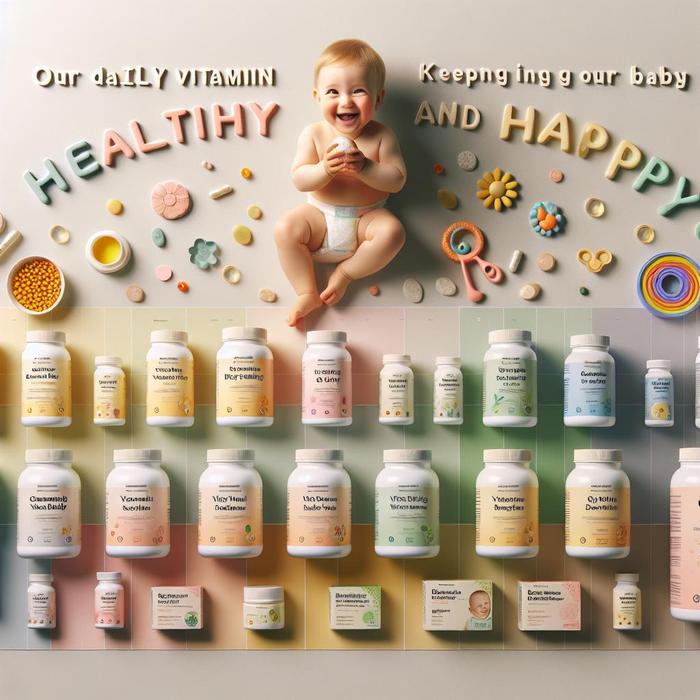Daily Nutritional Needs and Baby Vitamins
As parents, ensuring your little bundle of joy grows and develops optimally is top priority. A significant portion of this has to do with the nutritional health of your baby. This begins with breastfeeding, which provides the best mixture of nutrients for an infant and continues with the introduction of solid foods and possibly daily supplements as they grow.
Understanding Your Baby’s Nutritional Needs
Babies develop rapidly during their first year of life. They need a mixture of different nutrients to maintain their health and support rapid growth and development. The primary nutrients required by babies include:
- Vitamins: Essential for growth and development
- Minerals: Necessary for bone health and the production of healthy blood
- Fat: Required for brain development
- Protein: Critical for growth
- Carbohydrates: The body’s main source of energy
While most of these needs can be met through a balanced diet and breastfeeding, some babies may require additional vitamin recommendations. It is best to consult with your baby’s pediatrician to determine if there is a need for vitamin supplements for your baby.
When to Introduce Baby Vitamins
As a rule of thumb, breast or bottle-fed babies will typically get all their necessary nutrients from their diet. But in some cases, your healthcare provider may recommend baby vitamins. Particularly, vitamin D is recommended for breastfed babies, while iron is often prescribed for babies from 4 to 6 months. These recommendations depend on your baby’s health, diet, and sunlight exposure. Always consult your healthcare provider before starting any new supplement regimen for your baby.
When deciding to introduce supplements, the process should be gradual and monitored. Remember, the food your baby eats is just as important as the vitamins they may take. Understanding the balance between a healthy diet and supplement use is key to maintaining your baby’s nutritional health.
Our Experience With Baby Vitamins
Our journey with vitamins began during our baby’s first doctor visit. As we discussed our concerns about vitamin D deficiency due to minimal exposure to sunlight, our doctor suggested that we begin a daily vitamin D supplement routine. We noticed a significant improvement in our baby’s overall health and well-being once we began this regimen. This experience instigated our deeper exploration into the world of baby vitamins.
It is important to note that just as each baby is unique, so is their nutritional need. Therefore, our experience might differ from yours. You should always rely on the advice of your baby’s healthcare provider when considering dietary changes or supplements.
Choosing Quality Vitamins for Your Baby
Peruse the baby aisle at any store and you’ll find an array of vitamins for babies. However, the quality of these vitamins can substantially vary. To help find the best options, consider these factors:
- Trusted Brands: Opt for brands that are well-known and trusted in the industry.
- Ingredients: Choose vitamins that contain natural ingredients and avoid those with a lot of additives or preservatives.
- Form: For younger babies, liquid vitamins are usually the best option. As the baby grows older, chewable vitamins may be suitable.
Also, make sure to check the dosage instructions, as the correct amount depends on your baby’s age and weight. Your healthcare provider can help determine the right dosage.
Hopefully, our journey into the world of baby vitamins has given you a good starting point as you navigate your own. Remember, the first and most crucial step is always consulting with your baby’s healthcare provider.
Understanding Vitamin D for Babies
Vitamin D is a crucial nutrient in your baby’s diet. It helps build strong, healthy bones by aiding calcium absorption. The CDC advises that infants need about 400 IU of vitamin D daily, and breastfeeding moms may need more to ensure their milk provides adequate amounts.
Why Iron is Essential for Baby’s Growth
Iron is responsible for the production of hemoglobin, the protein in red blood cells that carries oxygen to all parts of the body. A deficiency can lead to anemia, affecting your baby’s growth and development. Infants, especially from the age of 4 to 6 months, require iron supplements as their own reserves tend to diminish during this period. You can learn more about this from the CDC’s page about iron and nutrition on their official website.
Important Tips on Baby Vitamins
While introducing vitamins, keep these factors in mind:
- Amount: Always adhere to the recommended dosage.
- Frequency: Most vitamins should be given daily, but some may be needed less often.
- Monitor: Observe the baby’s progress and take them to their regular checkups.
- Storage: Vitamins should be kept in a cool, dry place away from sunlight.
Ensure you consult with your healthcare provider so that they can guide you regarding the correct way to administer these vitamins.
Where to Find Information on Baby Vitamins
Information is power. The more you learn about baby vitamins, the better you can advocate for your child’s health needs. Here are a few resources that offer valuable insights:
- HealthyChildren.Org’s guide on vitamins and iron supplements provides comprehensive information on this topic.
- BabyCenter.com’s post on baby vitamins is a useful read, offering helpful advice on whether your baby needs vitamins.
Above all, your healthcare provider should always be the primary source of information on your baby’s nutritional needs and health.
Remember, every baby is different and will have individual nutritional needs. Never hesitate to contact your healthcare provider for guidance. We hope that our exploration of baby vitamins has been helpful and inspiring for you on your journey in providing the best for your child’s health and growth.

